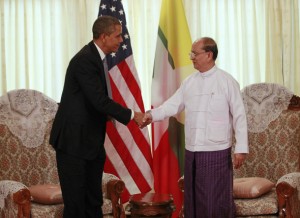President Thein Sein’s US Visit Branded by Broken Promises
By Burma Partnership • May 20, 2013 For the first time in nearly fifty years, President Thein Sein will visit the United States and meet with President Barack Obama today, 20 May. This follows the historic visit by President Obama to Burma six months ago. The visit is an opportunity for the White House to pressure Thein Sein to continue the reforms that have been taking place and highlight some of the concerns the United States, the international community and particularly the citizens of Burma have. The visit also represents the more troubling view that there has been a relaxing of the US policy of rewarding positive reforms with increased engagement and that there is more interest in the economic and geo-political benefits of the relationship than addressing and solving the very large problems that the people of Burma are facing inside their country today.
For the first time in nearly fifty years, President Thein Sein will visit the United States and meet with President Barack Obama today, 20 May. This follows the historic visit by President Obama to Burma six months ago. The visit is an opportunity for the White House to pressure Thein Sein to continue the reforms that have been taking place and highlight some of the concerns the United States, the international community and particularly the citizens of Burma have. The visit also represents the more troubling view that there has been a relaxing of the US policy of rewarding positive reforms with increased engagement and that there is more interest in the economic and geo-political benefits of the relationship than addressing and solving the very large problems that the people of Burma are facing inside their country today.
When President Obama visited Burma, Thein Sein made a series of pledges; he agreed to create a commission to review political prisoner cases with the aim of releasing all political prisoners from custody, to allow the office of the United Nations High Commissioner for Human Rights to open an office in the country, to adequately address religious violence, more specifically to hold those guilty of violence against Rohingya people accountable and address resettlement and citizenship issues, and finally to allow humanitarian organizations access to conflict areas.
Sadly Thein Sein and his government have failed to fulfill any of these pledges. For a start the United Nations High Commissioner for Human Rights has not been allowed to open an office. Political activists are being arrested or re-arrested on a daily basis; a committee to address political prisoners was formed but has been ineffective as seen by the recent political prisoner release which was decided unilaterally by the President’s Office, as with all previous political prisoner releases. The release of political prisoners would also hold more value if the government stopped arresting and thereby creating more political prisoners.
As opposed to addressing the very serious problems regarding the Rohingya, violence against both Rohingya and Muslims has increased around the country in the past six months. Human Rights Watch has recently put out a report that accuses Burma’s security forces and the Burma government of participating in ethnic cleansing. UN Special Rapporteur on the situation of human rights in Burma, Tomás Ojea Quintana, stated:
“received credible allegations that widespread and systematic human rights violations by state officials targeted against the Rohingya and wider Muslim populations have occurred and are continuing in Rakhine State. These involve the most serious of allegations, including extrajudicial killings, rape and sexual violence, arbitrary detention and torture and ill-treatment in detention, deaths in detention, and denial of due process and fair trial rights.”
Humanitarian organizations are still not given adequate access to conflict areas such as Kachin State, where conflict has been ongoing for almost two years and has recently been expanding to northern Shan State, creating more internally displaced people.
Burma is not living up to its promises. In response, US Congressman Joe Crowley proposed to renew sanctions, which would continue the ban on imports, especially gems. Hopefully, the United States legislature will support this and both Thein Sein and President Obama will take this seriously.
John Sifton, Asian Advocacy Director of HRW stated, “There are negative consequences for rights when diplomatic rewards continue even as reforms stall… If the US keeps delivering carrots on the same schedule while Burma breaks its promises, Burma’s leaders will conclude that they are no longer under serious international pressure to follow through on reforms.”
This visit gives the worrying impression that the United States is more concerned about economic investment in Burma and strategic interests regarding China, than protecting the rights and well-being of the people of Burma. It risks condoning the inaction of the Burma government on crucial conflict and human rights violations. If the relationship between Burma and the United States is to continue to positively develop, commitments must be kept, promises must be realized and the stated policy of matching action for action must be fulfilled.
Tags: Burma Partnership, Human Rights, President Thein Sein, Sanctions, United States, US President Barack ObamaThis post is in: Blog
Related PostsBurma Partnership Celebrates Continuing Regional Solidarity for Burma and Embraces the Work Ahead for Progressive Voice
Burma Army Displays Blatant Disregard for 21st Century Panglong Peace Process
Ann Din Coal Power Plant: Local Movement and Action to Preserve and Protect Natural Resources and Land: Mon IDP Report Case Study #4
Latest Human Rights Abuse Case Demonstrates Urgent Need to Reform the Myanmar National Human Rights Commission
Human Rights Far From Guaranteed as US Sanctions on Burma Are Removed









 All posts
All posts